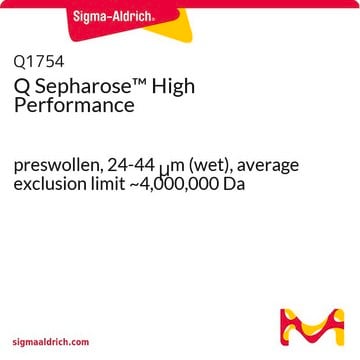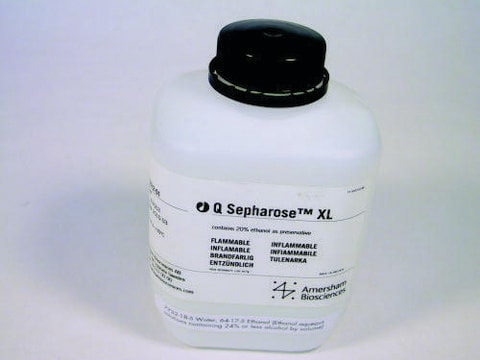S1799
SP Sepharose™
Fast Flow, aqueous ethanol suspension, 45-165 μm (wet), exclusion limit ~4,000,000 Da
Sinónimos:
Sulfopropyl-Sepharose™
Iniciar sesiónpara Ver la Fijación de precios por contrato y de la organización
About This Item
Productos recomendados
Quality Level
form
aqueous ethanol suspension
matrix active group
, —CH2-SO3-
particle size
45-165 μm (wet)
pore size
~4,000,000 Da exclusion limit
capacity
180-250 μeq/mL, gel
storage temp.
2-8°C
¿Está buscando productos similares? Visita Guía de comparación de productos
Application
SP Sepharose™ is used in protein chromatography, ion exchange chromatography and cation exchange media. SP Sepharose™ has been used to study inhibitory proteins and peptides from the rhizomes of zingiberaceae plants as well as to study the subunit heterogeneity and molecular evolution of soybean basic 7S globulin. SP Sepharose™ has also assisted with advancing industrial applications of preparation of chitosan oligosaccharides.
Physical form
Suspension in 0.2 M sodium acetate and 20% ethanol
Legal Information
Sepharose is a trademark of Cytiva
signalword
Warning
hcodes
Hazard Classifications
Flam. Liq. 3
Storage Class
3 - Flammable liquids
wgk_germany
WGK 1
flash_point_f
100.4 - 109.4 °F
flash_point_c
38 - 43 °C
Elija entre una de las versiones más recientes:
¿Ya tiene este producto?
Encuentre la documentación para los productos que ha comprado recientemente en la Biblioteca de documentos.
Los clientes también vieron
Maneerat Yodjun et al.
Applied biochemistry and biotechnology, 166(8), 2037-2050 (2012-03-07)
Ammonium sulphate cut protein extracts, and their pepsin hydrolysates, from the rhizomes of 15 plants in the Zingiberaceae family were screened for their in vitro angiotensin I-converting enzyme inhibitory (ACEI) activity. The protein extract from Zingiber ottensii had the highest
Andrei D Shutov et al.
Bioscience, biotechnology, and biochemistry, 74(8), 1631-1634 (2010-08-12)
Basic 7S globulin, a cysteine-rich protein from soybean seeds, consists of subunits containing 27 kD and 16 kD chains linked by disulfide bonding. Three differently sized subunits of the basic 7S globulin were detected and partially separated by SP Sepharose
C Y Cheng et al.
Biotechnology and applied biochemistry, 32 ( Pt 3), 197-203 (2000-12-15)
A chitosan-degrading fungus, designated Aspergillus sp. Y2K, was isolated from soil. The micro-organism was used for producing chitosanase (EC 3.2.1.132) in a minimal medium containing chitosan as the sole carbon source. The induced chitosanase was purified to homogeneity from the
Andreas Güntert et al.
Journal of Alzheimer's disease : JAD, 21(2), 585-596 (2010-06-24)
Alzheimer's disease (AD) is a progressive neurodegenerative disorder where definite diagnosis can only be made postmortem, and for which the most promising peripheral markers of disease state and severity have been found in the cerebrospinal fluid. However, recent results suggest
James C Geoghegan et al.
The Journal of biological chemistry, 282(50), 36341-36353 (2007-10-18)
The central pathogenic event of prion disease is the conformational conversion of a host protein, PrPC, into a pathogenic isoform, PrPSc. We previously showed that the protein misfolding cyclic amplification (PMCA) technique can be used to form infectious prion molecules
Nuestro equipo de científicos tiene experiencia en todas las áreas de investigación: Ciencias de la vida, Ciencia de los materiales, Síntesis química, Cromatografía, Analítica y muchas otras.
Póngase en contacto con el Servicio técnico
















